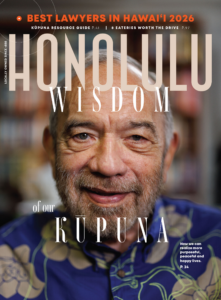To Fund or Not to Fund?
House bill proposes postponing a public campaign-spending program for 2014 elections.
Supporters of publicly funded elections got their big break last year when the Legislature passed Act 244, the Fair Elections Act. The act stipulates that a publicly funded $3.5 million piggy bank—which supporters believe will ease special interest group donations—will be used for Big Island City Council elections beginning next year. Organizations, such as Voter-Owned Hawaii, AARP and the League of Women Voters have been gaining momentum on this issue over the past decade.
Not so fast. The Fair Elections Act hadn’t even been around a year before HB 345 was introduced this session, with its supporters hoping to push back the start date to 2014. It gained support from Legislators who didn’t want it passed the first go around. The bill made it through the House but has been stagnant in the Senate for a month. Despite the deadlock, there seem to be some behind the scenes maneuvering to postpone the Big Island pilot project.
On Monday, the Hawaii County Councilors—who would be the guinea pigs for the project—passed a resolution 6-3 in support of delaying the project. (Because it’s just a resolution, it doesn’t hold the clout that a passed HB 345 would.) According to Kory Payne, executive director of Voter-Owned Hawaii, the contents of HB 345 could reemerge and push through in another related bill. That bill turns out to be HB 39 (returning to the House from the Senate this week), which Payne says if passed, could enable the state’s finance director to take out just enough of $3.5 million Hawaii Election Campaign Fund—the minimum required amount—to disable the project.
So why all the fuss? Opponents such as the Hawaii County Councilors, the Campaign Spending Commission and some Legislators believe it will be too expensive to successfully run. To receive money from the public fund, a candidate must obtain 200 signatures as well as a $5 contribution from each voter signature.
But for Payne and supporters, publicly funded elections “make sure [the politician] is trusted in the community. It will have a residual effect and we’ll see a higher voter turnout, changing the nature of politics” he says, adding that publicly funded elections have been successful in Arizona and Maine.
Because HB 345 is stalled in the Senate and HB 39 has not passed, as it stands the pilot project is still scheduled to begin next year. But according to Payne, given all the opposition, things don’t bode well for the pilot project. What do you think? Do you support publicly financed elections? Do people even care enough—especially in tough economic times—to help a politician run for office?
For pros and cons take on publicly funded elections, see our July 2008 Scrapyard.








